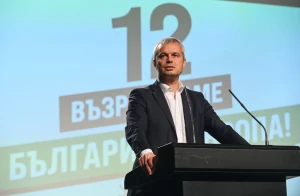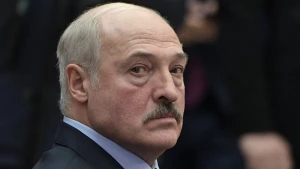
Ukraine can win war by the end of 2023 – military expert Crump
CEO of Sibylline Ltd Justin Crump, in an interview with Volodymyr Ostapchuk, host of the Spotlight Ukraine program on Espreso, told how much longer the Kremlin will be able to continue the war against Ukraine, who is behind the explosions in the Bryansk region, and whether Ukraine can win the war this year
Russia has lost more troops in Ukraine than the USSR did in all the wars after World War II. So when and how can the Kremlin be stopped?
You're right, the death rate from this invasion so far is horrific. The Russian troops are not only suffering heavy losses, but their medical network is also very poor, so many people who are injured in the Russian army die quite quickly when compared to the Ukrainian military, where many more people get medical care much faster and it saves more soldiers' lives. So, Russia is not only suffering more from the actions in Ukraine, but it is also losing more people through its own negligence. There's a perception that Russia has so much manpower and huge reserves of people, but we know that's not true, and that there's a point at which the losses will be so high that it will cause real discontent in Russia itself. But I don't think we have reached that point yet. The Russian people obviously still support the president to a certain extent, they have no choice, and those who had a choice have left. And of course we know that many people have left Russia out of fear. I think there's still a long way to go before these casualties alone will stop the war, but it will certainly only add to the Kremlin's problems a year after the invasion.
Do you think that new waves of mobilization in Russia will continue?
Russia wants to think that they can, but the last wave that they did generated a lot of people. We saw that they are poorly trained. This is especially evident in Vuhledar, where individual small groups of vehicles were attacking the same road over and over again. That's not impressive military efficiency, it's a very wasteful use of human lives. They mobilized a lot, they had a lot of problems training these people, and they had a lot of problems equipping these people. The pressure is felt on the frontline, especially around Bakhmut and in those areas where Russia is slowly and steadily advancing. But it's not a reserve that they can just tap into, they've already found that I think the idea of further waves of hundreds of thousands of people from Russia coming to the frontline, trained and ready, is unlikely, they just can't keep doing that.
Do they have a plan B for this case?
I think they're on plan Z, and it's not just plan B. The original plan was to take a key city in three days, maybe take the whole country in three weeks, and we've seen how that worked out for them. You know where they ended up a year after they expected to take Kyiv, Kharkiv and Odesa. They didn't do well in this regard. They haven't even captured Donbas, which I think remains their key objective, and I think the minimum that Putin can get away with is to capture all of Donetsk and all of Luhansk and then declare at least some form of a Russian victory in that regard, so that's pretty much the minimum that he has to achieve. I think right now they are desperately trying to take Bakhmut within six to seven months, advancing one field at a time, one forest at a time, one building at a time. You know, that's their plan, and there's no indication that they're going to be able to, if they break through the frontline against Ukraine, advance quickly in the way that maybe they thought they could a year ago. I think it's just out of Russia's reach at this point. So, they already have a lot of plans for the future and there's nothing else they can do. All they can do is keep doing the same thing that we see on the tactical level, hoping that eventually it will work, and of course Ukraine hopes that it will be able to stop.
You've probably heard the latest news, especially from the Russian media, which is spreading reports that a sabotage and reconnaissance group has allegedly infiltrated the Bryansk region of Russia from the territory of Ukraine and is actively working there. But meanwhile, the Ukrainian authorities claim that this is a Russian provocation, so what is it?
You know, this is a very strange incident. Judging by the reports on social media and the photos that are circulating, it makes no logical sense as a move by Ukraine. Obviously, these are Russian claims. In the photos of the people doing this, they are wearing yellow armbands and yellow markings on their helmets to make it as clear as possible that they are Ukrainians. They claim to be Russian volunteers fighting for Ukraine, and of course, there are many people we know among them, so that in itself is unusual. This is a kind of provocative step that Ukraine has always avoided in this conflict. The operations that Ukraine has conducted inside Russia have been much smaller, they've tended to be things like the attack with a couple of helicopters on Belgorod, which was the first bold retaliatory strike, I think, by Ukraine last year, and obviously these drone operations that we saw last week don't fit into that pattern at all. However, perhaps they do fit into the Russian model, according to which Ukraine is a terrorist state from Russia's point of view, which attacks civilians, taking them hostage in their homes. This is a very strange special forces operation compared to an attack on an oil refinery in Belgorod or military bases. It's a completely different goal, a completely different action that doesn't make sense at the moment. So, it all looks quite suspicious and certainly serves the interests of the Kremlin. It's remotely possible that it's Ukrainian troops, but it doesn't make any sense that it would be at this time. So we're waiting to see what happens next, but it looks pretty suspicious.
Do you believe that a civil war could break out in Russia?
We've certainly seen acts of resistance inside Russia, ranging from small things like arson attacks on recruitment centers, potential sabotage in other buildings, to larger-scale actions like sabotage of military equipment. We have seen helicopters sabotaged at air bases, and people filming themselves. And, of course, outside of Russia, in Belarus, we saw drone footage from the airfield where Russian airborne troop control planes are flying. Also attacks on the railroad, of course. So, these actions continue. I think that the prospect of Russia's disintegration into a full-scale civil war is quite distant at the moment. It remains a possibility, and Putin is actually using this to scare the West, saying, of course, if this all falls apart, what are you going to be dealing with. And, of course, he's also telling his people that the West is trying to dismember Russia. Again, this is a narrative that helps Putin. It helps him to try to get the West to stop supporting Ukraine. I don't think he will ever succeed in that. But he can direct it at his own people and say that we should be afraid, you know, what's going on, that the country might collapse, that we're under attack from NATO, that we're under attack from the outside, which is not true.
So I think that, despite some signs of discontent, things are far from being all right in Russia. Of course, the Russian people are very manageable. They're used to being controlled, the media is controlled, the message is controlled, they know it and they put up with it. I think there is a way to go before it gets to the point of maybe widespread disobedience and resistance.
And the last question: do you believe that Ukraine can win this war by the end of 2023?
Yes. I think we don't know what the outcome of the war will be in the end. But I would say that the fact that more than a year has passed since one of the three strongest armies in the world, as we thought at the time, invaded Ukraine, a country that at that time was not even sure that the invasion would take place and was not ready to defend itself, if you remember those uncertain times a week before the invasion, a month before the invasion, is already a victory.
A year later, we are talking about whether Ukraine can win or not, and it is already a victory that Ukraine is still fighting and, of course, has regained huge territories that were lost to the Russians. At the beginning, when the Russians had the advantage of organization and surprise, when they were pushed back in Kharkiv, pushed back in the south and holding the front line in Donbas under very heavy pressure, it forced Russia to mobilize hundreds of thousands of additional people to replace the losses. You know, this is by no means a Russian victory at this point, so by default, Ukraine is actually even winning by staying in the fight against Russia.
I think there is an opportunity for Russia to be pushed back even further by Ukraine. I think we will see the liberation of Crimea, we will see the liberation of southern Donetsk and Luhansk. I think that's the area that I think is generating a lot more discussion about what the end of the war will look like, especially among Western donors, I mean, will we ever see an invasion of Russia itself, you know, those are the kinds of questions that people are interested in. I think it's a much more gray area, but I think there's broad support for Ukraine to at least push Russia back to the borders that we saw before the invasion, which may not be enough for everybody in Ukraine who would like to liberate Crimea, who would like to liberate southern Donbas.
Of course, this is not a war that started last year, this is something that started in 2014 openly and long before that, I think. So even if the fighting ends, it will be the end of the conflict with Russia, but I think not as we see it, so we have a long way to go in the future. But I think Ukraine can certainly achieve more on the battlefield this year with the continued support and determination of the West, and we believe that will continue.
- News














































